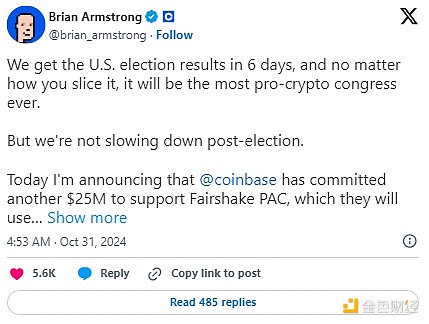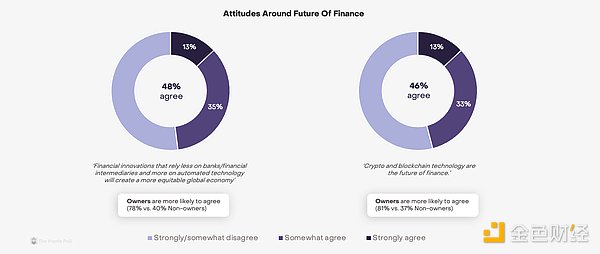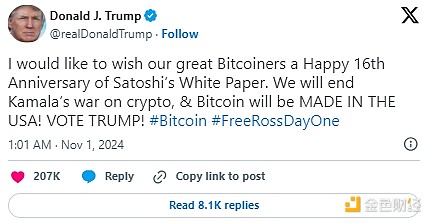Author: Jonah Roberts, Bankless; Compiled by Bai Shui, Jinse Finance
Cryptocurrencies were once a political afterthought, but have now rapidly become a focal point of the 2024 presidential election.
While there is certainly a groundswell of grassroots momentum behind this initiative, this election has also sparked an unprecedented lobbying effort in support of cryptocurrencies, backed by the industry's most powerful players.
Cryptocurrencies have become the largest lobbying spender this cycle. Fairshake has raised over $200 million from major donors like Coinbase, Andreessen Horowitz, and Ripple, and similar groups have poured vast resources into supporting bipartisan political campaigns, all with one goal: to help pro-crypto candidates win.
This is a major investment, but is the money well spent?

The Public's Perspective
Poll data shows that Americans are growing increasingly optimistic about the role of blockchain in finance. Public education on the potential of cryptocurrencies to promote financial inclusion has also had an impact. In a 2024 election poll, 48% of potential U.S. voters agreed that "reducing reliance on banks and relying more on automated financial innovations will lead to a fairer global economy." The same poll also showed growing public interest in cryptocurrency ownership and investment.

The increasing prominence of cryptocurrencies in public discourse has undoubtedly facilitated this shift in sentiment. While the effort has so far been primarily grassroots and privately funded, it is clear that policymakers are beginning to provide support. Developing positive policies and consumer protection measures is crucial to building public trust in this emerging industry.
The Current Political Landscape
So how is the political landscape actually taking shape? As the role of cryptocurrencies on the political stage has become increasingly apparent, both U.S. presidential candidates have been forced to take a stance and directly address the industry.
Donald Trump, with his characteristic bold approach, has promised that if elected, he will "make America the Bitcoin capital of the Earth." While his crypto ventures - including DeFi projects on Ethereum and the Trump Card NFT collection - have not always been impressive, his pro-crypto rhetoric has still garnered significant support within the industry.

Meanwhile, Kamala Harris' relationship with the crypto community is more complex, having served as Vice President during a period of increased regulation, alongside SEC Chair Gary Gensler. With Immutable becoming the latest company to receive a Wells Notice from the SEC, frustration in the industry has reached an all-time high. While the need for clear regulation has been widely accepted, the SEC's approach (demanding registration without providing a clear path) has felt punitive rather than constructive. Companies in the U.S. trying to work with the SEC have faced litigation, rather than guidance.
Now, Harris aims to signal a shift, indicating her intention is to "encourage innovative technologies like AI and digital assets, while protecting consumers and investors." She has also specifically mentioned protecting crypto investments for Black Americans. While advocacy groups like "Stand With Crypto" believe her words, many remain cautious, questioning whether this pivot is genuine or merely an attempt to attract a large voter base ahead of the election.

Sustainable Efforts?
As the crypto lobbying effort continues to expand, many question whether this money will truly elevate ideologically aligned thinkers in government, or simply enrich those willing to say the right things to meet donation quotas. With the growing political clout of the crypto lobby, some key questions are sure to arise:
Can we trust that those lobbying for crypto are representing the interests of the broader field, not just the private interests of the companies cutting the checks? While people may be more inclined to trust Coinbase, remember that not long ago, SBF was leading the industry's charge in Washington. How do we ensure the lobbyists representing the industry's most powerful players (now including financial giants like BlackRock) are voicing the concerns of driving crypto's values forward, and not just the private interests of the check-cutting corporations?
Can we trust the political support we're providing? Political lobbying often feels like an inefficient use of capital, but in the face of a regulatory environment actively constraining innovation in this space, it provides a path forward. The lingering question is, are we winning and elevating new crypto converts in Washington, or just attracting the most ideologically flexible candidates?
However, as cryptocurrencies gain political recognition and lobbying funds continue to pour in - shaping the views of Congress and key political figures - many question the alignment between crypto's fundamental ethos and these efforts.
Reflection
Broad political lobbying is not entirely in keeping with an industry built on the premise of finding better paths forward for our financial and governance systems. So can we honestly say this is the best way forward?
This is a complex issue, but this is my personal stance:
Cryptocurrencies are not an ideologically rigid technology. They do not inherently favor grassroots adopters over institutional ones. As such, cryptocurrencies are not inherently anti-establishment; they are simply embraced by many who hold these values. As Congressman Ritchie Torres wisely shared, cryptocurrencies offer benefits to every political persuasion: for liberals, an opportunity for greater freedom from government; for progressives, a chance to check corporate power; for conservatives, a means to create a freer market that is more accessible.
How we regulate this technology is crucial, but viewing it as a partisan issue will be counterproductive. Policymakers need to see cryptocurrencies for what they truly are: a fair technology stack with diverse use cases.
Ultimately, we hope all this lobbying money will help legislators expand their understanding of cryptocurrencies and increase awareness of their potential impacts. I'm cautiously optimistic about this shift occurring, partly because the discussion around cryptocurrencies is expanding, and partly because legislators like Congressman Ro Khanna indicate that internal changes are indeed happening.
While the impact of crypto political spending may not be fully clear until January and beyond (when the next U.S. President is sworn in), I hope that regardless of the election outcome, a new era for cryptocurrencies will emerge - one where they are better understood, better regulated, and ultimately better serve the global population that is already using them, curious about them, or even opposed to their existence.







